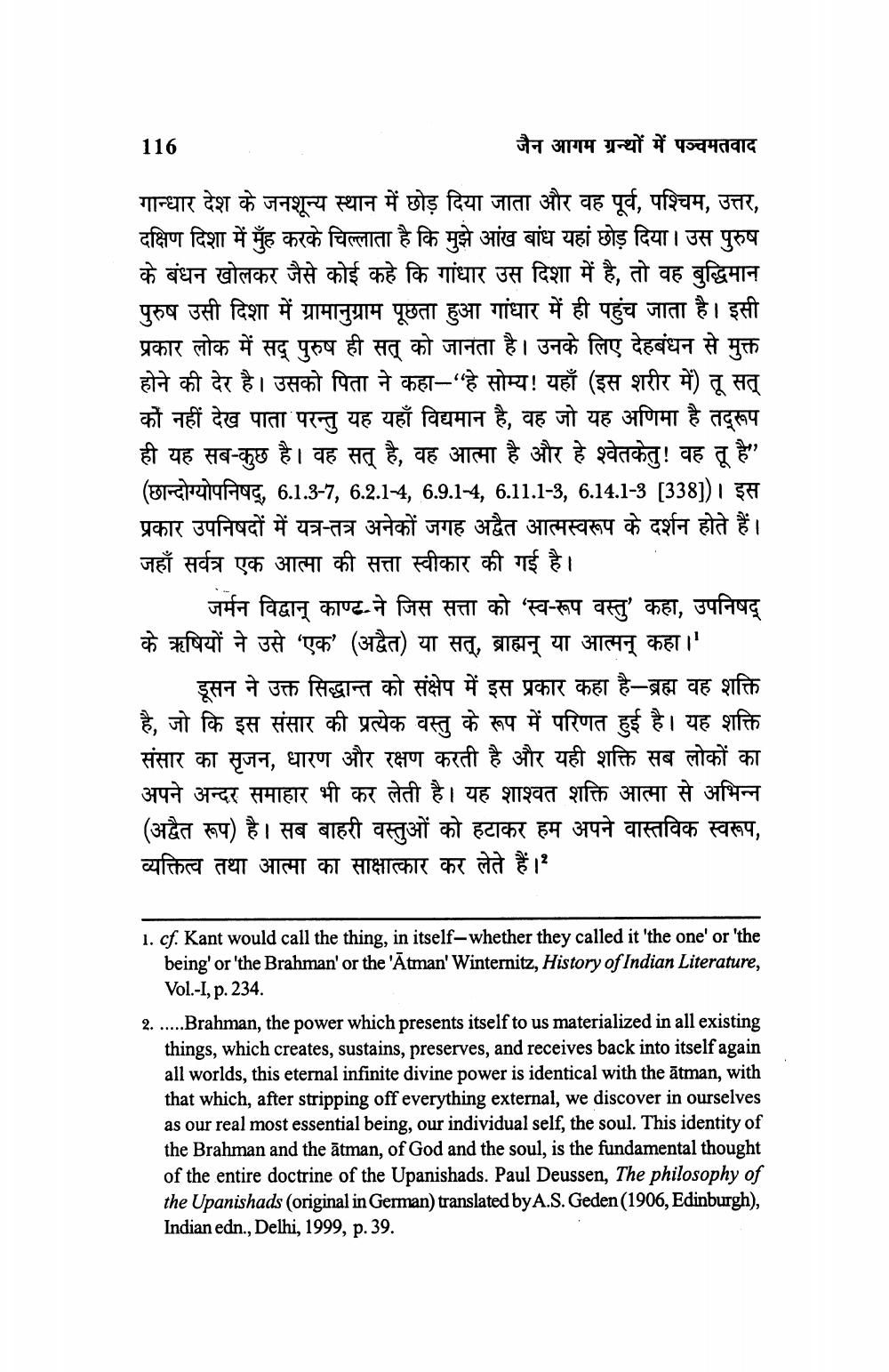________________
116
जैन आगम ग्रन्थों में पञ्चमतवाद
गान्धार देश के जनशून्य स्थान में छोड़ दिया जाता और वह पूर्व, पश्चिम, उत्तर, दक्षिण दिशा में मुँह करके चिल्लाता है कि मुझे आंख बांध यहां छोड़ दिया। उस पुरुष के बंधन खोलकर जैसे कोई कहे कि गांधार उस दिशा में है, तो वह बुद्धिमान पुरुष उसी दिशा में ग्रामानुग्राम पूछता हुआ गांधार में ही पहुंच जाता है। इसी प्रकार लोक में सद् पुरुष ही सत् को जानता है। उनके लिए देहबंधन से मुक्त होने की देर है। उसको पिता ने कहा-“हे सोम्य! यहाँ (इस शरीर में) तू सत् कों नहीं देख पाता परन्तु यह यहाँ विद्यमान है, वह जो यह अणिमा है तद्प ही यह सब-कुछ है। वह सत् है, वह आत्मा है और हे श्वेतकेतु! वह तू है" (छान्दोग्योपनिषद्, 6.1.3-7, 6.2.1-4, 6.9.1-4, 6.11.1-3, 6.14.1-3 [338])। इस प्रकार उपनिषदों में यत्र-तत्र अनेकों जगह अद्वैत आत्मस्वरूप के दर्शन होते हैं। जहाँ सर्वत्र एक आत्मा की सत्ता स्वीकार की गई है।
जर्मन विद्वान् काण्ट ने जिस सत्ता को 'स्व-रूप वस्तु' कहा, उपनिषद् के ऋषियों ने उसे 'एक' (अद्वैत) या सत्, ब्राह्मन् या आत्मन् कहा।'
डूसन ने उक्त सिद्धान्त को संक्षेप में इस प्रकार कहा है-ब्रह्म वह शक्ति है, जो कि इस संसार की प्रत्येक वस्तु के रूप में परिणत हुई है। यह शक्ति संसार का सृजन, धारण और रक्षण करती है और यही शक्ति सब लोकों का अपने अन्दर समाहार भी कर लेती है। यह शाश्वत शक्ति आत्मा से अभिन्न (अद्वैत रूप) है। सब बाहरी वस्तुओं को हटाकर हम अपने वास्तविक स्वरूप, व्यक्तित्व तथा आत्मा का साक्षात्कार कर लेते हैं।'
1. cf. Kant would call the thing, in itself-whether they called it 'the one' or 'the being' or 'the Brahman' or the 'Ātman' Winternitz, History of Indian Literature,
Vol.-I, p. 234. 2......Brahman, the power which presents itself to us materialized in all existing
things, which creates, sustains, preserves, and receives back into itself again all worlds, this eternal infinite divine power is identical with the ātman, with that which, after stripping off everything external, we discover in ourselves as our real most essential being, our individual self, the soul. This identity of the Brahman and the ātman, of God and the soul, is the fundamental thought of the entire doctrine of the Upanishads. Paul Deussen, The philosophy of the Upanishads (original in German) translated by A.S. Geden (1906, Edinburgh), Indian edn., Delhi, 1999, p. 39.




